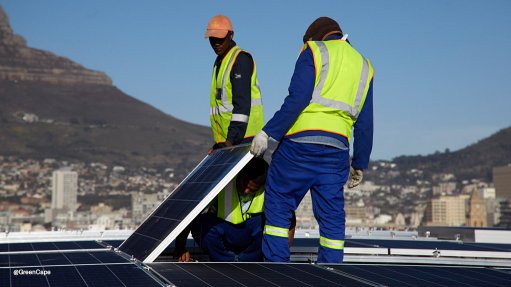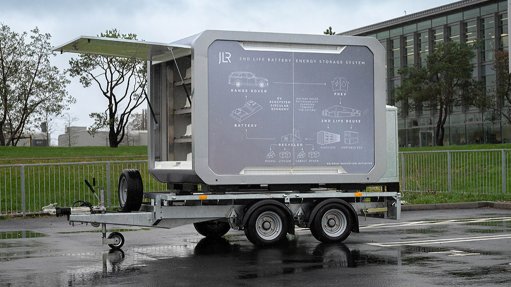Absa third-quarter economic outlook foresees food inflation peaking in November
Financial services firm Absa Corporate and Investment Banking economist Miyelani Maluleke said the bank, in its 'South Africa Third Quarter 2022 Quarterly Perspectives', expects food inflation to rise from 8.6% to a peak of 11.5% in November, before falling back to 4.8% by the end of 2023.
"We have seen sharp increases in food price inflation, but crop prices have started to ease, which is an encouraging sign. However, owing to a bit of lag, in the near term, food price inflation will push higher than what it currently is," he said in a July 28 briefing.
For some time after large global price shocks occurred, the transmission to local prices in South Africa was not as strong as in some advanced economies and South Africa's trading partners.
However, there were clear signs that inflationary pressures had broadened beyond food and fuel prices into other goods and services in the economy.
"The strongest sign of this was the large 4.4% increase in core Consumer Price Index (CPI) inflation in June, which is the highest since 2019, and which helped to push headline CPI inflation to a 13-year high of 7.4%," Maluleke said.
Core CPI inflation was expected to rise further and the bank expected it to peak at 5.6% in February 2023. The bank also forecasts that the Producer Price Index will peak at 18.6% in July, before declining sharply to average 8.6% next year.
Further, the bank expects headline CPI inflation will peak at a lower level compared with many advanced and developing economies, at 7.9% year-on-year in October. It was then expected to track sideways into the first quarter of 2023, before softening to end 2023 at 4.7%.
Higher inflation prints have sparked higher inflation expectations and strengthened workers’ wage demands, but Absa does not expect a wage-price spiral in South Africa, given the weakness of labour markets in general.
Further, consumer price inflation has now breached the South African Reserve Bank's (SARB's) target, and Absa expected it to remain above 6% until May next year. The bank expected it to return to within the target range by June, and then to moderate to about 4.5% by 2024, Maluleke said.
"We read the strong statement from the SARB following the Monetary Policy Committee (MPC) meeting in June as meaning that it would do what is needed to ensure inflation and inflation expectations are not entrenched at a higher level. Bringing inflation expectations back to the 4.5% handle will require the SARB to tighten monetary policy more.
"We expect to see more hikes of about 75 basis points during the September and November meetings and we have pencilled in a further 50 basis points of hikes to take the repo rate to 7.5%.
“However, as we get into next year, particularly the second half of the year, inflation may ease more decisively and can open space for the SARB to ease rates. We expect cuts during the second half of next year to a more neutral range of 6% to 6.75%," said Maluleke.
Meanwhile, multiple headwinds, including some hits to terms of trade, have led Absa to forecast that the current account balance will drop back into a mild deficit by the second quarter of next year and to potentially widen over the medium term. The bank forecasted that export commodity prices will fall 7.2% in 2022 and 17.7% in 2023.
"Our view is that, for the past few quarters, the current account surplus was a bit more than 3% of gross domestic product (GDP) and we expect it to fall to just below 1% of GDP going forward. We forecast that the current account will see a deficit of 0.4% of GDP by the second quarter," he said.
GROWTH EXPECTATIONS
With muted fixed investment spending, a constrained fiscus and a challenging environment for exports, South Africa’s near-term growth prospects seem contingent on consumer spending.
In its recent MPC statement, the SARB said that it expected consumer spending to remain strong in the near term, said Absa Corporate and Investment Banking economist Peter Worthington.
However, Absa is more cautious owing to the big hit to consumer disposable real income from inflation, which is likely to outpace wage growth and lead to higher debt servicing costs. Average monthly nominal earnings growth slowed to 1.8% year-on-year in the first quarter of the year, according to Statistics South Africa, he said.
"Encouragingly, firms now appear to be adding to their payroll numbers, albeit only marginally. That said, we believe the employment elasticity in South Africa is less than one, which means that growth in employment is likely to lag GDP growth unless there is a marked change in South Africa’s labour market policies," he pointed out.
Further, South Africa’s medium-term growth prospects remain constrained by chronic power rationing, big logistical problems with ports and rail, and persistently weak business sentiment and fixed investment spending.
"With a first-quarter gross fixed investment ratio of just 13.8% of GDP, South Africa’s capital stock would appear to be shrinking, as this is below the rate of depreciation on capital," Worthington said.
The deteriorating global growth outlook and tighter global financial conditions could also dampen South Africa’s growth prospects via reduced demand for the country’s commodity exports, he added.
"From 2024, however, we believe the load-shedding constraint could begin to ease materially, given the ambitious electricity plan announced by President [Cyril] Ramaphosa this week.
"If the programme is implemented in full and quickly, it will be a major step forward as it is quite a comprehensive vision for solving South Africa's power problems. A problem is that implementation could remain weak, and there is no mention of required investments in transmission lines in the programme," Worthington said.
However, even with these electricity reforms, South Africa will still suffer bouts of load-shedding and will face other challenges, such as the interest rate, less supportive global conditions and ports and rail infrastructure not working to required levels to boost exports and the associated growth potential.
These factors have prompted Absa to downgrade its growth expectations to an average of 1.6%, although this could rise if load-shedding were to abate. If electricity reform is achieved, then Absa expected that growth could rise to 2% or more from 2025 onwards, he said.
Comments
Press Office
Announcements
What's On
Subscribe to improve your user experience...
Option 1 (equivalent of R125 a month):
Receive a weekly copy of Creamer Media's Engineering News & Mining Weekly magazine
(print copy for those in South Africa and e-magazine for those outside of South Africa)
Receive daily email newsletters
Access to full search results
Access archive of magazine back copies
Access to Projects in Progress
Access to ONE Research Report of your choice in PDF format
Option 2 (equivalent of R375 a month):
All benefits from Option 1
PLUS
Access to Creamer Media's Research Channel Africa for ALL Research Reports, in PDF format, on various industrial and mining sectors
including Electricity; Water; Energy Transition; Hydrogen; Roads, Rail and Ports; Coal; Gold; Platinum; Battery Metals; etc.
Already a subscriber?
Forgotten your password?
Receive weekly copy of Creamer Media's Engineering News & Mining Weekly magazine (print copy for those in South Africa and e-magazine for those outside of South Africa)
➕
Recieve daily email newsletters
➕
Access to full search results
➕
Access archive of magazine back copies
➕
Access to Projects in Progress
➕
Access to ONE Research Report of your choice in PDF format
RESEARCH CHANNEL AFRICA
R4500 (equivalent of R375 a month)
SUBSCRIBEAll benefits from Option 1
➕
Access to Creamer Media's Research Channel Africa for ALL Research Reports on various industrial and mining sectors, in PDF format, including on:
Electricity
➕
Water
➕
Energy Transition
➕
Hydrogen
➕
Roads, Rail and Ports
➕
Coal
➕
Gold
➕
Platinum
➕
Battery Metals
➕
etc.
Receive all benefits from Option 1 or Option 2 delivered to numerous people at your company
➕
Multiple User names and Passwords for simultaneous log-ins
➕
Intranet integration access to all in your organisation


















